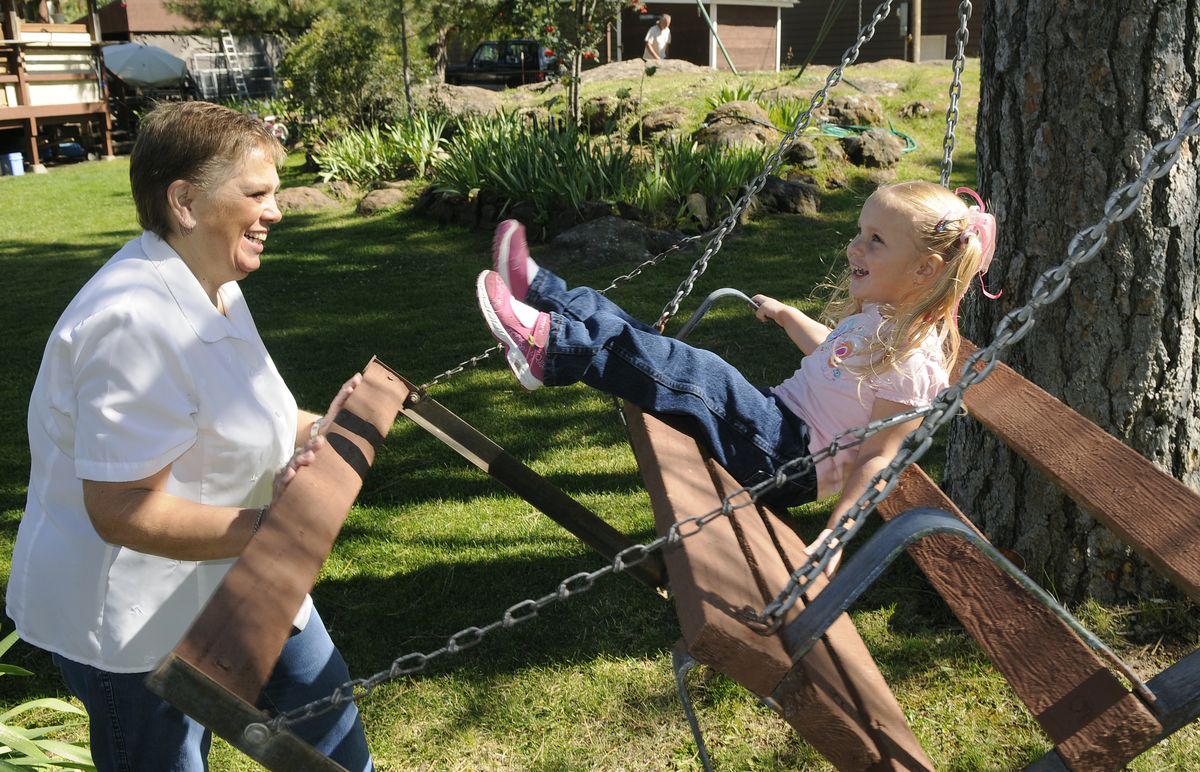GRAND FASHION
TAKING ON THE PAREnTING ROLE IN

At 57, Deb Pittack is a mother again.
It wasn’t exactly how she expected to spend her retirement years, but the Cheney resident says she didn’t have a choice. When her daughter could no longer care for her baby, Pittack sought and received full custody of her granddaughter.
Now, years after raising their own children, Pittack and her husband, Tony Jamerson, are at home again with a 3-year-old. Instead of traveling all over the country in an RV, their lives revolve around KarmaLena – around naps, meals, playtimes and a 7 p.m. bedtime.
Since she became a member of their household at the age of 15 months, the spirited toddler has kept her grandparents on their toes. So instead of resting and relaxing during their retirement years, Pittack and Jamerson have essentially become parents again.
“It’s wonderful because you always have your loving grandchild present and with you,” Pittack said.
At the same time, it hasn’t exactly been easy, she acknowledged. Having a little one at home also means waking up several times at night, dealing with tantrums, learning how to discipline, chasing after a kid to make sure she’s safe as well as other responsibilities that aren’t as easy when you’re closer to 60 instead of 30, Pittack said.
“I’m not Grandma anymore – I’m Mom,” she explained. “I can’t do the spoiling that grandparents do and then send her home.”
Like Pittack and Jamerson, a growing number of grandparents are finding themselves as the primary caregivers to their children’s children. In some cases, these seniors are stepping up when death, mental illness, drug addiction, imprisonment and other problems make it impossible for parents to rear their kids.
Nationwide, about 4.5 million children are living in households headed by grandparents, according to 2007 statistics compiled by the AARP Foundation, The Brookdale Foundation Group, Casey Family Programs, Child Welfare League of America, Children’s Defense Fund and Generations United.
In Washington state, 61,905 children live in grandparent-headed households, according to the statistics. In Idaho, that figure is 13,636.
According to statistics from AARP and the other organizations that work on behalf of children and/or seniors, about 2.4 million grandparents nationwide are responsible for these children’s needs. These seniors often assume these duties without either of the child’s parents present in the home.
While most embrace the responsibility of caring for grandkids, many of these grandparents have to work hard to make ends meet. In addition to the physical and mental challenges of becoming parents once again, they also experience financial pressure. Some seniors live on a fixed income and don’t always have the extra money for piano lessons, summer camp and other expenses, let alone pay college tuition.
For many of them, caring for their children’s children also means putting their retirement goals and dreams on hold with the risk of never fulfilling them.
“You have to do the right thing. You have to step up to the plate and take care of the grandkids,” said Pittack.
“The hardest part is losing our own dreams. That’s all off the table now. We’ve got sports and school and college ahead of us. The days of getting in the car and going fishing or to the casino are all done. …
“We have a child now and she needs the stability of a home.”
With the increasing number of grandparents raising grandkids, many seniors are banding together for support.
In Colville, from about a dozen to as many 30 grandparents gather every month as part of United Grandparents Raising Grandchildren. According to Rita Brown, a longtime member of the group, many seniors come in order to get information about how to get custody of their grandkids who are in foster care.
Brown, who’s 68, has been caring for her 15-year-old granddaughter since she was a little girl. The child first came to live with her when she was 2 1/2 but was taken to foster parents a year later. When her granddaughter was 5, Brown spent thousands of dollars in legal fees and won full custody of the child.
As a little girl, her granddaughter struggled with health issues and other problems. To help her heal and become independent, Brown and her husband, who’s now 78, attended parenting classes, read books on discipline and worked closely with the little girl to assure her that she was safe, secure and loved.
Parenting has changed significantly since the ’50s and ’60s, explained Brown, who raised four children during that era. That’s one of the reasons why she advises other grandparents to take classes so that they, too, can learn and grow along with their grandchildren.
Now, her granddaughter is “a dynamic, well-adjusted, caring young woman who doesn’t take anything for granted,” said Brown. “I am so proud of this child. She is an amazing and beautiful young woman.”
Like other grandparents raising grandkids, Brown schedules her day around her granddaughter’s school and extracurricular activities that include swimming, piano and ballet.
It’s a lot of work, especially for someone her age, Brown said, but she wouldn’t change a thing. She loves her granddaughter, she said, and considers it a privilege to be part of her life.
Pittack also has no regrets about becoming a parent again, even though she sometimes misses having the freedom to travel and spend time with other adults.
“Most people are worn out after a weekend with their grandkids,” she said. “We take it one day at a time.
“She is a little miracle for us,” she added. “Every day with her is like Christmas. We love her and there’s nothing we wouldn’t do for her.”